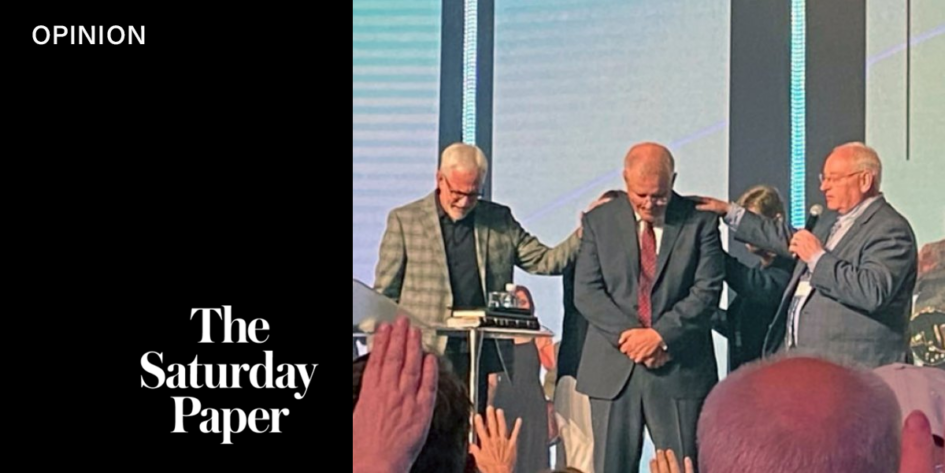By James Boyce: The Saturday Paper
Australians have, on the whole, a traditional respect for other people’s religious beliefs, and believe it is irrelevant to the governing of the country.
But Scott Morrison is the world’s only Pentecostal believer, and understanding his faith is fundamental to understanding his conduct as Prime Minister, and his behaviour during the Covid era.
A man who believes he is an instrument of God and that we are living through the end of days before Christ’s imminent return, while talking to Australians of “getting to the other side” as if they were his personal parishioners, is a man whose beliefs and his fitness for the highest office in the land should be thoroughly examined.
Below is an extract from The Saturday Paper by respected historian James Boyce, author of Born Bad: Original Sin and the Making of the Western World.
But first some background.
Boyce wrote in his seminal Matilda piece Scott Morrison and the Devil, the world is so used to stories on the decline of Christianity that the rise of Pentecostalism, which emerged in Los Angeles in the early parts of the twentieth century, has been widely overlooked.
Boyce argued: “The assumption that the prime minister’s Horizon Church in Sydney’s Sutherland Shire can be understood as just another conservative denomination is a major mistake: while Pentecostalism is outwardly conformist and, in its Australian variant, heavily influenced by American evangelicalism, its core teachings are very different from those of the evangelical and reformed churches that it is generally associated with.
“The religion’s starting point is not the written-down teachings of Jesus, the moral code set out in the Bible, or the instructions of the institutional Church. Nor is its essence captured by conservative Christian campaigns on sex, marriage and gender.
“The essence of our prime minister’s religion is not a set of beliefs at all but a unique perspective on the Christian experience in which God is so intimately present to the saved and sanctified that he can be felt, talked to and heard at any time.”
Extract: Scott Morrison and Pentecostalism. The Saturday Paper.
The release of an unauthorised video of the prime minister preaching at his church’s national conference last month has given Australians a glimpse of an unknown man in another world. Here was a leader clearly at home with his people, using mysterious metaphors to encourage fellow believers in a spiritual war in which Satan and the spirit of God are fighting it out for the souls of our nation’s young people.
Even those familiar with traditional church services will not easily understand the nature of Scott Morrison’s fellowship with his scandal-prone but always forgiven cabinet colleague “Brother Stuie” Robert, “a great brother of mine over a long period of time”.
Nor may they comprehend the divine healing disguised in a prime ministerial embrace: the fact he has been “in evacuation centres where people thought I was just giving someone a hug and I was praying”.
No one who has heard this sermon – so starkly different from that which might be heard in a suburban congregation or even a traditional evangelical church – can continue to accept the pretence that the prime minister’s Pentecostalism is so conventional it needs no further explanation or is just a private religious matter of no public relevance.
What is required of the media is no different from the approach that would be taken with a politician proclaiming adherence to any other value system – have its teachings transparently communicated, so that people can understand what their representative believes.
Maintaining a distinction between public image and doctrinal belief has been an effective strategy for both Pentecostal growth and prime ministerial success. Seeing Morrison preach has confirmed the dangers of this.
The argument that it is necessary to hide the full truth except from those who are considered ready to receive it is a slippery slope to cultism in both its religious and political dimensions. To question and critique is not, as Fogarty has argued, to be part of an inquisition; it is to participate in democracy.
RELATED STORIES




1 Pingback